- Home
- Sophie Davis
Fragile Facade
Fragile Facade Read online
Sophie Davis
Fragile Façade (Blind Barriers Trilogy #1)
Second Edition Copyright © 2017 by Sophie Davis Books
All rights reserved. No part of this publication may be reproduced, stored in a retrieval system, or transmitted by any means – electronic, mechanical, photographic (photocopying), recording, or otherwise – without prior permission in writing from the author.
Printed in the United States of America
Learn more: www.sophiedavisbooks.com
In memory of our precious buddy, Humphrey.
You would’ve made an excellent detective.
Fragile Façade (Blind Barriers Trilogy #1)
Platinum Prey (Blind Barriers Trilogy #2)
Vacant Voices (Blind Barriers Trilogy #3)
Talented (Talented Saga #1)
Caged (Talented Saga #2)
Hunted (Talented Saga #3)
Captivated (A Talented Novella) (Talented Saga #3.5)
Created (Talented Saga #4)
Exiled: Kenly’s Story (Talented Saga #5)
Marked (Talented Saga #6)
Privileged (Talented Saga #7)
Fated (Talented Saga #8)
The Syndicate (Timewaves Series #1)
Atlic (Timewaves Series #2)
Legends Untold (Timewaves Series #3)
“The secret of a great success…
is a crime that has never been found out,
because it was properly executed.”
—HONORÉ DE BALZAC
Prologue
Lark
Lark. Lark. Lark. Lark. Lark. Lark.
My name is Lark. Of this I am certain.
Everything else? I’m unsure.
This place…I was never meant to be in this place. I had everything, everything anyone could ever want. I was the golden girl. Things like this don’t happen to people like me.
I am stuck between now and then, between my past and what should’ve been my future. Invisible barriers imprison me, cut me off from yesterday and blind me to tomorrow. And there is no way out.
My life before feels like a dream, and now I’ve woken to a nightmarish reality. If my memories were to vanish, like me, would I even exist? It would be easy to forget everything that happened, everything I planned to be…should I let go?
I can’t. I won’t. If I forget, who will be left to remember?
That’s what I’m supposed to do: let it all slip away. But I can’t let go of what I’ve lost.
I was never meant to be in this place, this place meant for other people. Until I understand how I came to be here, I am merely a passenger. I cannot leave. I am stuck here, waiting for someone to understand me, to remember me, to find me.
My solitary hope is her. I think she could get it, this girl who has so much less than I ever did, but more than I ever will. Somehow, fate decided that I am the lock, and she holds the key. If I can make her understand that, maybe I will not fade and disappear. Maybe someone will find me.
Maybe he will find me.
I know you’re there. Please, uncover what happened to me….
One
Raven
Humidity curled the dark bangs covering my forehead. Sweat slicked the back of my neck and trickled down my spine like a slow-moving hot spring. I held my lacy tank away from my skin as I walked, hoping to keep it as dry as possible.
Two minutes later, I stood in front of a brick row home wedged between two identical façades. The front porch needed a paint job, but it was cleanly swept. I rang the doorbell labeled “3” and waited. Only the pounding of feet on wooden stairs let me know that it worked.
An impossibly tall, model-thin girl close to my age opened the door a moment later. A pang of envy struck me immediately; I’d never get away with that haircut. It was short, nearly shaved, and complimented her sharp features perfectly.
“Kim?” I guessed.
“Raven, I presume?” Kim asked, revealing a dimple on either side when she grinned.
“Yep.” Her caramel eyes lit up as she nodded and pushed the door open.
“Apartment is up three flights.” She called, already several steps up the dimly lit staircase with a questionable wooden handrail. “I hope you like the place. You’d be doing me a huge favor by subletting.”
Over our brief email exchange about the apartment, Kim explained that she’d originally been turned down for the extra financial aid needed to spend the fall semester abroad in Paris. When the funding came through at the last hour, she’d already signed the lease for another year.
Her situation was a blessing for me. She was flexible on the price, and I offered her three months’ rent in lieu of references and paystubs. We were one showing away from a done deal.
Kim took the stairs two at a time. I followed close behind, checking out the faded, floral wallpaper. So far, it was the opposite of what I envisioned when I dreamt about living in the city. There was no chic, only shabby.
You’re not in Pennsylvania anymore, I thought.
“You get used to the stairs after a couple of weeks,” Kim promised on the third flight. “On the plus side, it’s a great butt workout.”
My glutes were already burning.
“You said in your email that you’re new to the area,” Kim started as we reached her landing. “Are you going to school?”
“Not yet. I’m going to work for a year first.”
I’d dutifully applied to colleges for my parents’ sake, but my heart had never been in it. College was in my future, just not my immediate future. The pressure of declaring a major that would dictate the course of my life was too much. Working and interacting with people outside of my hometown for a year or two would hopefully give me some real-world perspective. At least, that was my public justification for the sabbatical. Really, I’d just wanted to blow that Pennsylvania popsicle stand. My desire to see what was beyond my small town drove me to take on summer and after-school jobs instead of hanging out with my friends.
Kim pushed the apartment door open with one hand, the metal “3” swaying beneath a small peephole. “Welcome to your new home!” she said, making a sweeping gesture with her free arm.
My first impression was that the apartment was cozy. Extremely cozy. The kitchen was nothing more than an alcove to the left of the door, its appliances smaller than normal ones. Two high-backed stools at the pass-through counter separated the space from the living room. A faded floral loveseat and worn suede chair were arranged around the battered wooden coffee table next to the bay window. The television was mounted on the wall, the focal point of the living room.
“I’d love to leave the furniture, if that works for you?” Kim said, closing the door behind us. “Storage is expensive as hell.”
“That would be perfect,” I told her, though my voice lacked enthusiasm. I had no furniture, so I’d be eating ramen noodles on the scarred wooden floorboards without Kim’s shabby pieces.
“The bedroom and bathroom are down that hallway,” Kim said, pointing off to the left.
“Hallway” was a generous term for a space with exactly four floor tiles. On the plus side, the apartment would be easy to clean. I opened one of the two doors and found the smallest bathroom I’d ever seen. The shower was a stall, no tub, though the porcelain toilet and pedestal sink were bright-white and clean. A pretty blue rug covered the floor tiles but didn’t quite hide the fact that several were cracked.
“I know it’s not much,” Kim said hesitantly, as if sensing my trepidation.
My dreams of a cute one-bedroom in Georgetown had been extinguished when I realized the cost of living in D.C. was astronomical compared to my rural hometown. This was my price range. In fact, it was the only place I could afford with a little extra cushion.
“N
o, no, it’s great,” I quickly assured her.
When I turned and met Kim’s caramel eyes, they showed pure relief. I wondered how many others had turned down the apartment already.
“The bedroom is here,” she said, pushing open the other door.
The room was surprisingly large, with enough space for a queen-sized bed, dresser, and a roll-top desk. Kim’s laptop was open on the desk, surrounded by scattered papers and stubby oil pastel sticks. Other than those and the nearly full suitcase open on the bed, the space was clean and uncluttered.
“Art major,” Kim said sheepishly when she noticed me eyeing the art supplies.
“Cool,” I replied absently, checking out the closet. A few scattered articles of clothing remained on the built-in shelves, while the plastic clothes hangers were all empty. My meager wardrobe would make the closet appear cavernous, since I’d left most of my clothing at my parents’ house. A new life meant starting over completely.
Rotating slowly, I acclimated to what would be my new bedroom. I decided that I liked it. It was nothing special, but there was a quaint, lived-in feel. It was easy to picture myself sitting at Kim’s antique desk, reading the news on my laptop. Or lying atop the fluffy, checkered comforter, one foot resting on the opposite knee with my dog-eared copy of The Great Gatsby.
“So, what do you think?” Kim asked, her voice breaking into my thoughts.
“I’ll take it,” I said with a grin.
“Excellent. Phew!” She beamed back, exhaling a relieved sigh. “I was hoping this would work out, now I’ll have time to visit my parents before heading abroad,” Kim explained. “Would it be okay if I gave you the keys now? You can move in any time after tonight, I’m going to head out in the morning.”
“Sounds good,” I nodded, my stomach flipping with excitement. I’d just rented my very first apartment.
Kim walked back to the kitchen and gestured for me to sit at the counter.
“You want some coffee? Water? Sorry, that’s all I have to offer.” Kim frowned.
“Some water would be great,” I said, thinking of the heat outside.
Kim pulled two plastic bottles from the fridge and handed me one. While she rifled through a drawer next to the stove, I sipped my water and traced the ring of condensation on the countertop. A copy of the Washington Post sat to the side, the first physical newspaper I’d seen in ages. A picture of a teenage girl, no older than I was, stared up from the frontpage. The headline read, “Jewelry Heiress’ Disappearance Still Baffles Police.”
Kim was still searching for the keys, so I reached for the paper absently while she continued to rummage around. The picture of the girl looked like a senior portrait from high school. Her blonde hair was perfectly parted down the center, shining even in the grainy newspaper photo. Her straight, white teeth peeked out from behind pink lips that were glistening with a light layer of gloss. A collared shirt, crisp and starched, had two buttons undone, revealing a small gold heart hanging from her slender neck.
I didn’t need to read the article to know she was one of those girls: the privileged, offspring of equally beautiful, ridiculously wealthy parents. There had been girls like that in my high school, though their wealth was nowhere near that of a jewelry fortune. I’d never felt comfortable in their presence and always kept my guard up.
Still, there was something in the newspaper girl’s wistful gaze that pulled at my heartstrings. Her smile was almost sad—it didn’t come close to touching her big, blue eyes. Those eyes looked as though they held secrets she was too young to have. I knew that look. My hair was shorter and darker than hers, and my eyes were dark brown, while hers were cornflower blue. Nevertheless, my senior picture—the one prominently displayed on my parents’ mantel—showed a girl with the same expression. Feigned happiness.
“Have you been following her disappearance?” Kim asked, noticing the paper in front of me and giving the article a tap. “Doesn’t seem the type to go rogue. I mean, why would anyone give up all of that?”
I looked up in time to catch the end of Kim’s exaggerated eye roll.
The question was rhetorical, but I felt the need to answer anyway. “I haven’t read anything about it, but when something seems too good to be true…it probably is,” I replied, shrugging.
“Take the Post if you want, I don’t have time to read it.” Kim ran one hand over her cropped hair. “Anyway, here are the keys. This one,” she indicated a silver key, “goes to the main door downstairs. This,” she pulled a gold key free, “goes to the deadbolt. And the third goes to the bottom lock on the front door.”
“And you said cash was okay?” I asked, pulling an envelope from my front pocket with the carefully counted rent money and security deposit inside.
“Definitely. It’ll be easier to exchange,” Kim replied, swapping me the keys for the envelope.
My chest swelled with pride. The weight of the keyring felt good in my hand. Just like the car, this small step felt monumental. I’d made it out of my small town, a place no one ever left. My new beginning was really happening.
The Capital Hostel was only two miles from the apartment, but the bus’s frequent stops and roundabout path made the return trip longer than necessary. I popped earbuds in and hit “play” on one of my chill playlists. My mind wandered back to the missing girl. Lark Kingsley’s blue eyes were haunted. Her smile reminded me of a celebrity on the red carpet, like she’d practiced it in the mirror until only the most discerning eye could spot it as a fake. Resting my head against the window, I considered all the reasons the sole heiress to a diamond fortune might have to “go rogue”, as Kim put it, until the bus reached my stop.
At the convenience store two blocks from the hostel, I bought a box of granola bars and another bottle of water. Instead of going back to my room, I took advantage of the sunshine and set up camp on a park bench in McPherson Square. I preferred the outdoors in general, but especially when the other option was the hostel’s cinderblock walls, tiny square window, and metal bunkbeds. That place was downright institutional. The thought of spending the afternoon in there made my skin itch.
D.C. was insanely humid this time of year, the air heavy with oppressive moisture. The city was built on a swamp, so it wasn’t that surprising. But the sky was a clear blue and the sun was shining. Every so often, a gentle breeze ruffled my hair and made the heat bearable.
Trading my music for the park’s chatter, I caught snippets of conversations about government sequestration and possible shutdown. My shorts, tank top, and flip-flops were glaringly out of place among the suits worn by the political crowd on their lunch breaks, but I still felt sophisticated. This was a whole new world for me. One I couldn’t wait to really become a part of.
Retrieving Kim’s copy of the newspaper from my bag, I settled in with a granola bar and read more about the missing jewelry heiress. Along with the front, the story of Lark Kingsley’s disappearance continued for three pages inside. According to her parents, the socialite had planned a celebratory trip with her friends before she was supposed to start at Columbia University—a week-long getaway to the British Virgin Islands. The Kingsleys’ driver took Lark to JFK, but she never got on the plane.
Her friends claimed Lark called and said something came up, that she would catch a later flight to meet them in St. Barts. She never showed. One of her friends—a girl who wished to remain anonymous in her newspaper interview—said that Lark’s behavior had been erratic of late, so failing to show up wasn’t out of character. When asked why none of the girls called the Kingsleys from the Caribbean to let them know Lark never made it, the nameless friend said, “We didn’t want to get her into trouble.” An entire week passed before Lark’s parents were aware their daughter vanished.
“They sound like great friends,” I muttered sarcastically under my breath.
Lark’s friends, family, teachers, and even the priest at her local church had been interviewed. Everyone described the missing girl as “smart,” “well-liked,” “popul
ar,” and “happy.” As I stared at a photo montage of Lark Kingsley’s life, I knew the first three might be true, but the latter was a façade. In one picture, she stood between two girls, her thin arms slung around their shoulders and that contrived grin on her beautiful face. All three wore white collared shirts, plaid skirts, and blazers with their school logo prominently displayed on the left breast.
Another showed Lark with two older people, and the photo caption confirmed they were her parents. Mr. Kingsley was nothing short of a silver fox, though the silver was mostly just around his temples. His face was tan and appropriately lined for a man his age, like he spent a lot of time on the family yacht. Mrs. Kingsley was gorgeous. Her shiny blonde hair sat in a perfect bun high on her head. Big, innocent eyes were a shade of blue that matched her daughter’s. The Kingsleys were all dressed in formal wear: a classic tuxedo for the patriarch of the family and long gowns for the two ladies. A pearl necklace with the largest ruby I’d ever seen was fastened around Mrs. Kingsley’s neck, and dime-sized pearls adorned her earlobes. In contrast, Lark’s ears and throat were bare. Maybe she wasn’t as keen as her mother to be a walking billboard for the family business.
The last picture screamed, “Prom.” Lark faced a cookie-cutter prep-school boy. He was definitely good-looking but in a generic way. While Lark smiled for the camera, the boy grinned at her. No boy had ever looked at me quite like that.
As I ran my fingers over the page, the ink smudged onto my skin. The caption identified her prom date as Adam Ridell. His last name was vaguely familiar, though it took a moment to realize why—there was a Senator Ridell from New York. Given Lark’s social circles, Adam might have been his son. Lark Kingsley looked like the type of girl who dated sons of senators.

 2446-89
2446-89 Shadow Fate 2: Sacrifice
Shadow Fate 2: Sacrifice Vacant Voices (Blind Barriers Trilogy Book 3)
Vacant Voices (Blind Barriers Trilogy Book 3)![[Blind Barriers 01.0] Fragile Facade Read online](http://i1.bookreadfree.com/10/blind_barriers_01_0_fragile_facade_preview.jpg) [Blind Barriers 01.0] Fragile Facade
[Blind Barriers 01.0] Fragile Facade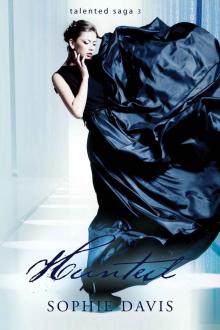 Hunted (Talented Saga # 3)
Hunted (Talented Saga # 3)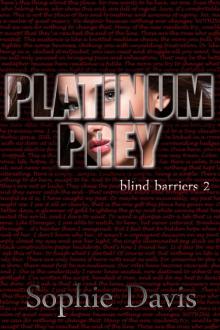 Platinum Prey (Blind Barriers Trilogy #2)
Platinum Prey (Blind Barriers Trilogy #2)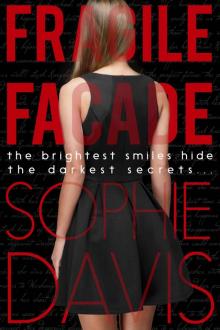 Fragile Facade (Blind Barriers Trilogy Book 1)
Fragile Facade (Blind Barriers Trilogy Book 1) Created (Talented Saga)
Created (Talented Saga) The Syndicate (Timewaves Book 1)
The Syndicate (Timewaves Book 1) Platinum Prey
Platinum Prey Talented
Talented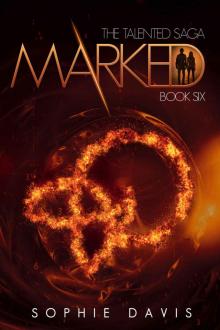 Marked (Talented Saga Book 6)
Marked (Talented Saga Book 6) Unforgettable (Talented Saga #6)
Unforgettable (Talented Saga #6)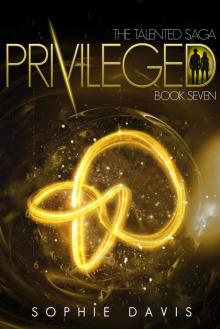 Privileged (Talented Saga Book 7)
Privileged (Talented Saga Book 7)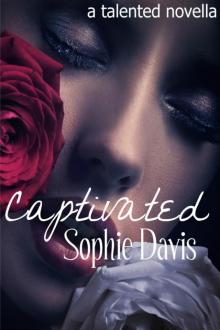 Captivated (Talented Saga #3.5)
Captivated (Talented Saga #3.5) Exiled: Kenly's Story (A Talented Novel)
Exiled: Kenly's Story (A Talented Novel)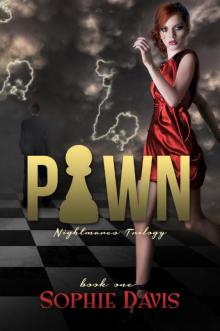 Pawn (Nightmares Trilogy #1)
Pawn (Nightmares Trilogy #1) Exiled_Kenly's Story
Exiled_Kenly's Story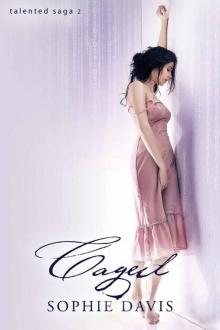 Caged (Talented Saga)
Caged (Talented Saga)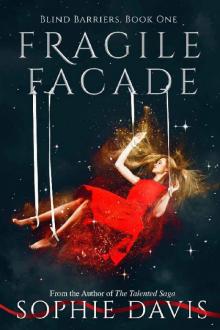 Fragile Facade
Fragile Facade Fated: The Epic Finale (Talented Saga Book 8)
Fated: The Epic Finale (Talented Saga Book 8) Inescapable (Talented Saga #7)
Inescapable (Talented Saga #7)